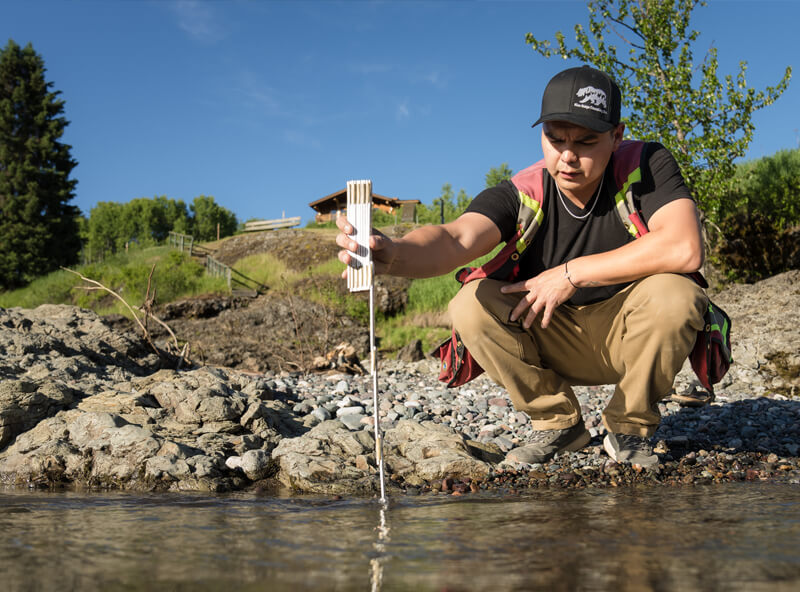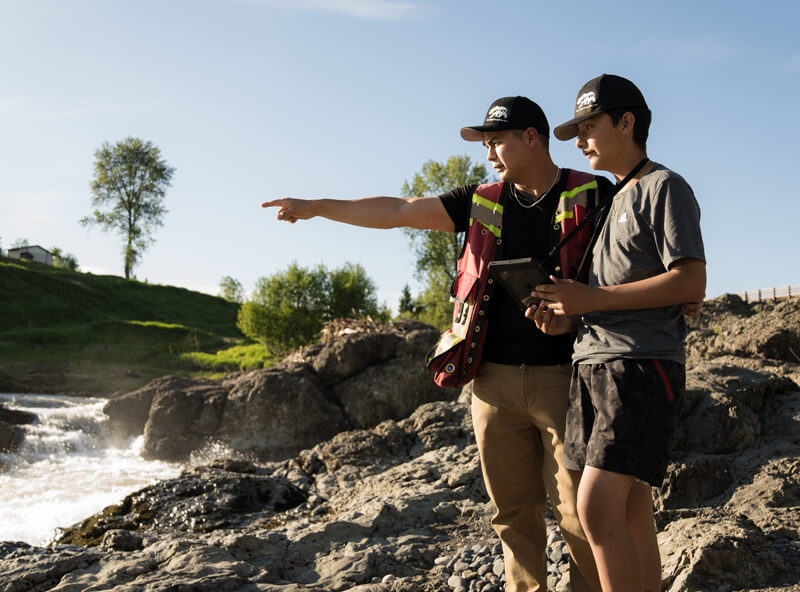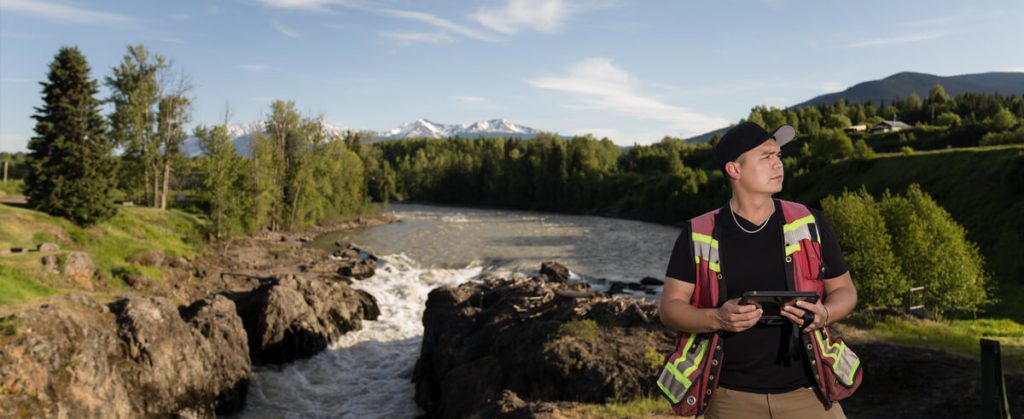It took us away from our territory.
Dallas Nikal is a 32-year-old Wet’suwet’en Wildlife and Fisheries biologist from Tsayu (Beaver) clan. He is the co-chair of the Skeena Sustainability Assessment Forum, a collaborative initiative involving between six and ten Skeena Nations and provincial agencies working together on environmental stewardship.
The seeds for his journey to collaborative stewardship were planted 27 years ago when he abruptly stopped going to the family cabin on their territory outside Houston B.C. As a kid, he didn’t understand why. The cabin was an important place for family and clan connection and teaching and a jumping off point for catching beaver, moose, and fish.
“It was devastating. We just stopped going. Later, I learned that the water at the lake was polluted from mining, and it wasn’t safe to go there anymore.”
In college, Nikal learned about how industrial site selection often disproportionally impacts First Nations lands and came to recognize this childhood experience as environmental racism. He felt motivated to never be in this position again.
“It had a big impact on my life, my grandma’s life, my family’s life, because it took us away from our territory.”
I knew people did that, but I didn’t know I could do that.
“Growing up in my community the only employer was the band office, and the 90’s was a total different time for Indians. There was lots of discrimination.”
Nikal was only 19 when he became a dad.
“I did my journey backwards,” he laughs. “I had my son first and then figured out my career.” After working a variety of retail and desk jobs, he landed a job with the Wet’suwet’en fisheries department marking and recapturing salmon, in 2013.
The fisheries job meant Nikal accompanied biologists in the field. This was his first real introduction to what would soon become a lifelong passion and career. “Seeing the biologists out on the land – I knew people did that, but I didn’t know that I could do it.”
He says he decided then and there, “I want to be out here, getting paid to be in the bush, having purpose, monitoring the land. It felt good. Like I was doing something good for my people.”
Growing up at the collaborative table
Nikal went back to school in 2014 and essentially grew up within the Skeena Sustainability Assessment Forum. He interned every summer as a technician while completing his education.

His journey was closely watched and supported by First Nations at the table, including Evelyn George, Forum Representative for Lake Babine Nation.
“Dallas believes in what he was taught,” says George “He loves his land and very passionate about it.” George also says that Dallas’ presence at the table gives her intergenerational hope. “I always tell him that the world is a better place with him standing up for our land. We need more young people to stand with education and traditional teaching behind them.”
The Skeena Sustainability Assessment Forum is eight years old and has seen its share of stalemates and tension, according to Nikal.
“First Nations would raise ideas and hear a lot of ‘No’s’ from the Province,” reflected Nikal. “Federal and provincial legislation puts us in a box that wasn’t created for us. While we understand that government is constrained in that box, we as First Nations who have unceded territory and self governance, we don’t necessarily have to be in that box.”
As First Nations strive for true co-management, Nikal says that the province is still in its infancy. “I have a lot of people reach out just asking, how do we engage?” He says this is important step but can also lead to frustration from First Nations at the table who are eager to get to joint decision-making.
Nikal shares three factors that have made the relationship better at the table he grew up at.
1. Co-designed and trusted data
Trusted data, trusted decision is the first mantra of the forum.
Nikal says government officials have a history of working in isolation on major projects and initiatives and then coming to his community with an almost finished product and a short window to make a decision.
“Our Nations are complex, and they have lots of decisions to make,” explains Nikal. “When we are not part of it from the beginning, they [the members] don’t trust it, and they don’t trust you.”
The forum itself isn’t a decision-making table. Rather, it’s a co-management space that gathers data, knowledge holders, and western expertise to make recommendations to support government-to-government decision-making.
Table membership is currently collaborating on the timber supply review process, which determines how much wood can be taken from an area. Traditionally, it has been the Province working with licensees through a structured process to come up with a recommendation that the Chief Forester would make. In the Skeena, the forum members are working directly with the Chief Forester using co-developed data to make decisions.
Braiding together multiply forms of knowledge and data is the table’s strength. The forum now possesses a treasure chest of shared and trusted data sets for environmental monitoring of medicinal plants, grizzly bear, fish and fish habitat, moose, and wetlands.
Nikal says that shared data is an important decision-making tool for First Nations and that soon the parties will be making decisions together.
The forum is finalizing a collaborative decision support tool that the Province and the Nations will use to make decisions regarding cumulative impacts.
He says, “We’ve learned that we need to be able to build it together, or else it’s not going to work. Data that we collect is helping to drive big decisions in our territory.”
2. A changing public service
The forum’s provincial team is composed of a lot of younger non-First Nations scientists who Nikal says are open to working in new ways.
“I’ve seen a lot of changes within the staff where, we were really bumping heads at the beginning. We are all victims of our time and it’s no secret that the older you are the more you can get stuck in your ways. The scientists, the provincial staff at our table, are from a new generation of Canadians that want to collaborate. They are learning more about First Nations history, and residential school and other harmful policies.”
The forum also spends time orienting one another. Last summer, the table hosted a large workshop where each of the ten Nations gave a 101 presentation. It included cultural and territorial overviews, and how things work in community. Dallas says this is something that is not taught in schools but is vital to the relationship.
For those that are stuck in the old ways, Nikal encourages them. “People just need to see the world is changing. And that First Nations now have a say.”

3. Safe spaces to disagree.
Part of Nikal’s job as a co-chair is to hold and manage the inevitable conflicts that arise at the forum. He says the cost of unmanaged conflict is silence and lost opportunity.
“To quote Dan George, ‘Not one of us are as smart as all of us.’ We should feel comfortable speaking up, and it has to be two-way. We have to have those provincial workers feel safe too. We’re all always learning.”
Tangible steps to create safe space include the development of a shared vision and protocols and predictable decision-making processes.
“There are a lot of people from the province who do really good work. And it’s about building that relationship and that trust on both sides.”
Bringing two worlds together
When Nikal reflects on being disconnected from his family territory as a kid, he says that could never happen today.
“When a proponent comes to my family or community, we’re not reliant on outside consultants who may have other motives. Now, I’m able to speak the language back to the proponent. I’m also able to tell my family, my people- This is what they mean.”
Nikal says that a science background has enabled him to see and walk in both worlds.
He and his partner Alexandra took the leap during the COVID-19 pandemic, and opened Nico Ridge Consulting, which provides technical and environmental services to First Nations, NGO’s and government in culturally safe and appropriate ways.
Dallas says that he draws a lot of strength from his Grandma Helen Nikal. Her Wet’suwet’en name Misilos, means the tall person (while she is actually quite short). “She is definitely one of the strongest people I know. She fights for our clan; she fights for our people.”
It’s this fighting spirit that keeps Nikal focused on his life work to increase power-sharing between First Nations and the Province. “People always think it’s selfish why First Nations want power and want stewardship. But it’s not just for us, it’s for them, these Canadians that live here. We want to make sure there’s enough moose for all of us. Fish for all of us. It’s bigger than just the Nation, it’s because we’d like our future generations to have what we grew up with.”
“It was devastating. We just stopped going. Later, I learned that the water at the lake was polluted from mining, and it wasn’t safe to go there anymore.”

